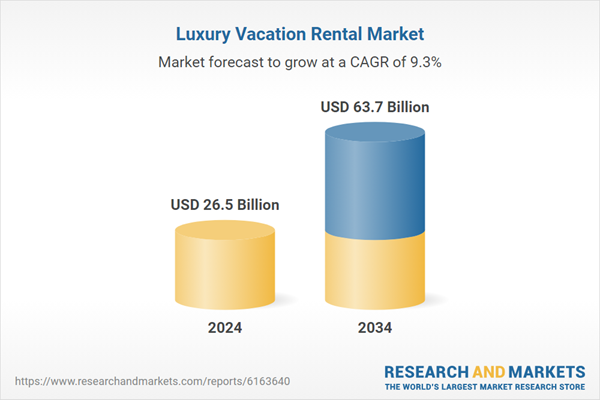Luxury rentals have evolved into high-value assets for brands appealing to modern travelers who prioritize privacy, customization, and elevated service standards. The focus is no longer on square footage and views alone, but on delivering experiences tailored to individual preferences. Features such as wellness amenities, private chefs, and smart tech-enabled concierge services are becoming expectations rather than luxuries.
In the wake of the pandemic, safety and personal space have become essential factors influencing choice. As high-net-worth travelers return to international travel, bookings for standalone estates, chalets, and secluded villas are surging. Simultaneously, a strong emphasis on hygiene, digital personalization, and smart property technologies continues to shape the evolution of premium vacation rental offerings around the world.
The luxury villas and private estate segment held 49% share and is projected to grow at a CAGR of 10% through 2034. These expansive properties appeal to affluent families, remote professionals, and multigenerational groups due to their ability to combine personal privacy with high-end amenities. Customized guest experiences - ranging from private spas and wellness services to in-home dining and concierge planning - make these rentals ideal for travelers seeking full control over their stay. Their larger footprints and secluded settings meet increasing demand for both space and exclusivity. Wealthy travelers continue to gravitate toward luxury homes that offer flexibility, lifestyle alignment, and upscale aesthetics, especially in sought-after global locations. These rentals are also attractive to investors, as they consistently generate high returns in regions with strong tourism infrastructure and consistent demand.
Online travel agencies segment held 45% share and is expected to grow at a CAGR of 10% between 2025 and 2034. OTAs are transforming the booking experience with their global accessibility, user-friendly platforms, and increasing use of intelligent features. Through advanced search filters, AI-powered recommendations, and real-time availability, they simplify the decision-making process for high-income travelers. These digital platforms continue to lead in luxury bookings by pairing curated listings with tech-enhanced customer journeys, combining service excellence with seamless usability. Their ability to showcase high-value properties and deliver efficient, contactless reservations is proving crucial for market growth. As global travel rebounds, OTAs are also offering flexible booking policies and loyalty integrations to meet traveler expectations and increase repeat usage across regions.
United States Luxury Vacation Rental Market held 82% share and generated USD 9.6 billion in 2024. The country’s strong economic fundamentals, transparent legal framework, and broad portfolio of high-end destinations - ranging from coastal resorts to urban escapes - contribute to its leadership in this space. Institutional investors and property owners favor the U.S. for its predictable real estate regulations and streamlined transaction processes, which offer greater confidence and stability. Both international and domestic travelers view the U.S. as a reliable market for luxury rentals, thanks to its established infrastructure, diverse experiences, and continuous innovation in hospitality. Furthermore, rising interest in flexible travel, work-from-anywhere setups, and exclusive staycations is helping to reinforce the U.S. as a hub for premium vacation rental demand.
Major companies actively shaping the luxury vacation rental industry include Onefinestay, VRBO, Rental Escapes, Le Collectionist, Luxury Retreats, Plum Guide, and Airbnb Luxe. Each brand plays a significant role in enhancing consumer trust and expanding access to refined, personalized travel accommodations. To secure stronger market positions, leading players in the luxury vacation rental industry are deploying highly targeted strategies. These include building robust proprietary booking platforms that offer seamless digital experiences and personalized guest interactions.
Many are also expanding their global portfolios by acquiring or partnering with premium local property managers to ensure quality standards and regional authenticity. Other companies are investing in high-touch concierge services, integrated smart technologies, and loyalty programs tailored to affluent clientele.
This product will be delivered within 2-4 business days.
Table of Contents
Companies Mentioned
The companies profiled in this Luxury Vacation Rental market report include:- Airbnb Luxe
- Booking Holdings
- Expedia Group (VRBO Premier)
- Homes & Villas (Marriott International)
- TripAdvisor
- AvantStay
- Edge Retreats
- Elite Havens
- Le Collectionist
- Natural Retreats
- Sonder Holdings
- Vacasa
- LUXJB
- Luxury Villa
- Onefinestay (Accor Group)
- Plum Guide
- RedAwning
- Villa Plus
- Luxury Retreat (Airbnb)
- Oliver's Travels
- Onefinestay
- Villas of Distinction
- Blueground
- Rental Escapes
- Selina Hospitality
- Zeus Living
Table Information
| Report Attribute | Details |
|---|---|
| No. of Pages | 170 |
| Published | July 2025 |
| Forecast Period | 2024 - 2034 |
| Estimated Market Value ( USD | $ 26.5 Billion |
| Forecasted Market Value ( USD | $ 63.7 Billion |
| Compound Annual Growth Rate | 9.3% |
| Regions Covered | Global |
| No. of Companies Mentioned | 27 |









